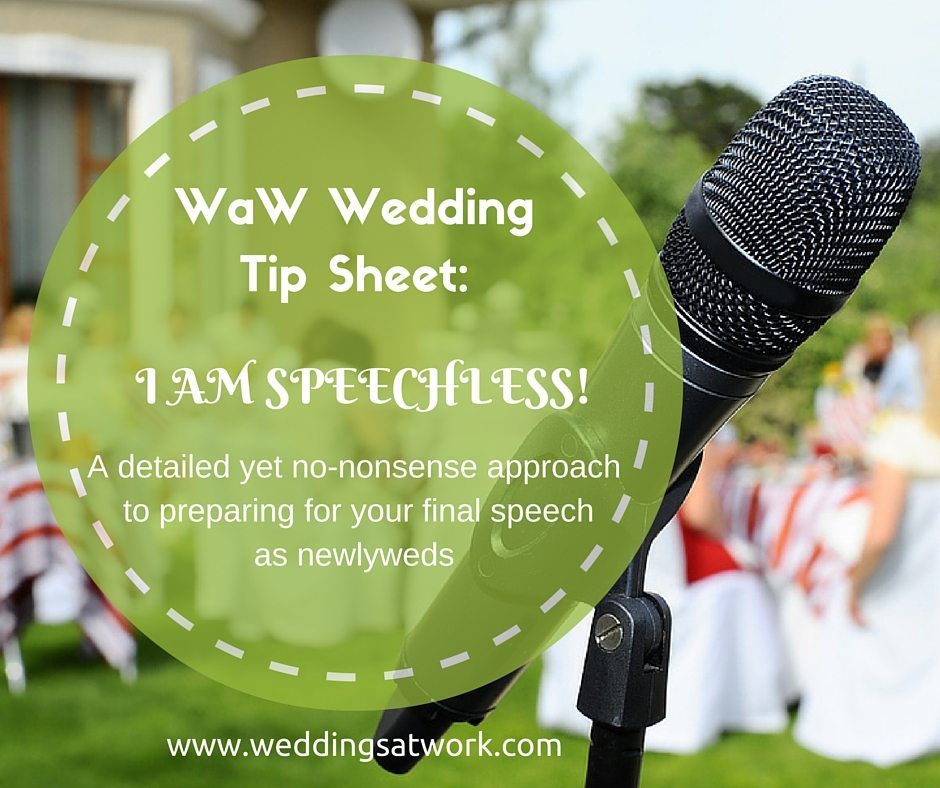WaW Wedding Tip Sheet: I am speechless!
[cs_content][cs_section parallax=”false” style=”margin: 0px;padding: 45px 0px;”][cs_row inner_container=”true” marginless_columns=”false” style=”margin: 0px auto;padding: 0px;”][cs_column fade=”false” fade_animation=”in” fade_animation_offset=”45px” fade_duration=”750″ type=”1/1″ style=”padding: 0px;”][x_feature_headline level=”h2″ looks_like=”h3″ icon=”lightbulb-o”]A detailed yet no-nonsense approach to preparing for your final speech as newlyweds [/x_feature_headline][/cs_column][/cs_row][/cs_section][cs_section parallax=”false” style=”margin: 0px;padding: 45px 0px;”][cs_row inner_container=”true” marginless_columns=”false” style=”margin: 0px auto;padding: 0px;”][cs_column fade=”false” fade_animation=”in” fade_animation_offset=”45px” fade_duration=”750″ type=”1/1″ style=”padding: 0px;”][cs_text]Since I really spend time preparing reception programmes with my couples, I am often asked about what should be included in the final speech and who should speak.
Let’s tackle the question on who should speak. I feel both should be given airtime. However, the longer message should be delivered by the one who can communicate better. I know that seems blunt but you have to admit, it is also practical. Think of one of the basic tenets of communication: the medium is the message.
While you’re debating with your spouse-to-be regarding who should have longer airtime or if you can divide the message equally, let me tackle the actual contents of the message that should be delivered during the final speech.
First, let me point out that it’s always better to have an outline. That way, you won’t veer off course, say something you will regret later, and ramble on and on. It will help you stick to your division of labor as well, so one does not end up saying what the other one has been planning to say all along.
What’s in the outline?
1) Thank God/your creator, without whom, you would not be here today.
2) Thank your parents for bringing you up, supporting your decision, giving financial assistance, being with you every step of the way, etc.
3) Thank the parents of your partner for making you feel welcome, for rearing your partner to be the kind of person he/she is, for being supportive of your decisions regarding your journey as husband and wife.
Both the groom and bride should have airtime to thank their own parents, and the parents of their spouse. After the thank you messages, the groom should reassure his bride’s family that he will take care of her. The bride can also reassure the groom’s family that she will love him and respect him as a wife.
4) Thank your respective families for accepting your choice of a lifetime partner.
5) Thank your godparents. You may say their names, but if you will, add a tidbit as to why they were chosen. It helps to have a list. If you can’t say reasons for choosing them since the parents were the ones who chose them, then better to just thank them in general for accepting the role of being a second parent. That way, no one will feel left out or unwanted.
If one of them was responsible for causing you to meet your spouse, you may mention the person without mentioning the rest.
6) Thank your entourage. You may say their names, but again, you don’t want to do so unless you have something to add to just saying the name.
However, if one or two contributed more, then you may say their names instead of saying all names.
For instance, if one volunteered to take care of coordinating with the attire provider and the rest of the female ento, you may thank her because she definitely took away a lot of stress.
If one volunteered to make an AVP for you and came through, then by all means, mention the person during your speech.
7) Thank your relatives and friends. Do this in general unless you have a list of groups to thank or you have a list of people who traveled great distances just to show their support for your big day.
8) Thank your suppliers. You may say one general statement or you may mention those who really worked hard by name. That will motivate them to keep on giving their all to each and every wedding they would handle.
9) Thank your spouse. Say your appreciation for him/her especially with regard to wedding preparations.
Just be careful that this does not end up like a repetition of your personal vows.
Lastly, you can invite them to party the night away with you. That’s a good ending. They will know they can still stay, drink, and spend time with you.
IMPORTANT NOTES:
a) A speech should have a beginning, a middle, and an end.
A good start might focus on how happy you are to start your journey as husband and wife with everyone in your midst.
The middle would focus on all the people you’d like to thank.
The end would be an invitation to party or even an invitation to please continue praying for you as husband and wife or to continue being supportive partners in your journey towards raising a family.
b) If your partner is more shy, have him/her talk within the middle part of your speech. That way, he/she does not need to have a good beginning and a good ending to his/her speech.
c) Stick to a time frame of 3 minutes. You will know you’re taking up more than 3 minutes when you see guests checking out their phones, fidgeting, standing up, looking bored, yawning, etc.
d) Avoid repetitions. If one is more shy than the other, one can stick to thanking one’s parents and family, the spouse’s parents and family, and the spouse. The rest can be assigned to the one who is more willing to hold on to the mic.
e) Do not mention individuals and groups if you’re not sure you can mention all of them. Remember: Forgetting a particular person/group is mortal sin. Weddings are emotionally-charged events.
f) Do not drink too much before giving your speech — you will not sound good, you will not know what you’re saying, and you might say something you will regret.
Definitely, you will not make a good first impression on those who will be meeting you or seeing you for the first time if you end up too drunk to delivery your final message. You still have the after party to get drunk, if you really must.
Read more of Darlene Tan-Salazar’s Wedding Tip Sheet articles at www.weddingsatwork.com/category/waw-wedding-tip-sheet/.[/cs_text][/cs_column][/cs_row][/cs_section][cs_section parallax=”false” style=”margin: 0px;padding: 45px 0px;”][cs_row inner_container=”true” marginless_columns=”false” style=”margin: 0px auto;padding: 0px;”][cs_column fade=”false” fade_animation=”in” fade_animation_offset=”45px” fade_duration=”750″ type=”1/1″ style=”padding: 0px;”][cs_block_grid type=”two-up”][cs_block_grid_item title=”Block Grid Item 1″]

